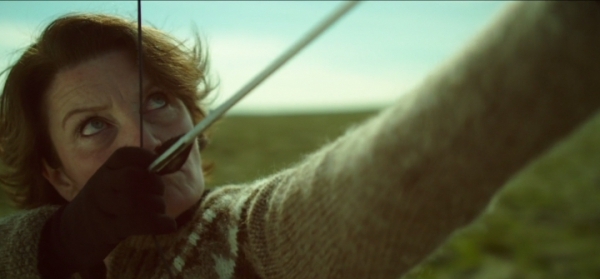BRATTLEBORO — In a desolate, mountainous wilderness, a woman fixes an arrow to her bow and sends it flying over electric pylons standing like hideous giants across the land. Attached to the arrow is a string. Attached to the string is a metal cable, which, when pulled across the top of the wires, short-circuits the grid, instantly shutting down the huge aluminum smelter they feed.
So begins Woman at War, an Icelandic film by Benedikt Erlingsson that could not be more timely: The Intergovernmental Panel on Climate Change has just issued its most dire warning ever. We are now at the crossroads of destiny.
As the archer, Halla the Saboteur (played by Halldóra Geirharðsdóttir), writes in her manifesto, “The sabotage against our nature causing atmospheric warming is a crime against humanity and all life on Earth. The globalized industry is the force behind this suicidal charge that not even democracy can stop.”
Speaking of democracy, as we pause in our day to write our legislators, call our senators, send postcards in the hopes of righting the wrongs being perpetrated all around, raise money, and hold vigils and protests, what do we think of that concept? Is what we do really enough?
Wouldn't it be amazing to see how a masterful film answers that question with “No”?
In this Icelandic saga for our times, nothing less than the crippling of the infrastructure - with the resulting chaos and immediate, vital changes to the self-destructive course of humankind - will do. The fact that the vigilante is a kindly middle-aged choir conductor, secretly willing to risk her life for what she believes, makes the film that much more compelling.
* * *
Halla is hunted across the Icelandic countryside by helicopters, satellites, thermal cameras, soldiers and police, and bloodhounds, by all the latest technology, including a special nod to those handy little government spy devices we call smartphones. Drones with infrared cameras pursue her into the mossy rocky wilds of Iceland, and it seems a battle she cannot possibly win.
The political becomes personal, however, when an application for the adoption of a Ukrainian child is unexpectedly resurrected. Can one be a good parent as well as a saboteur?
By this time, Halla is the victim of the Icelandic government's desperate and clever propaganda efforts to discredit, and capture, her by any means necessary. She has, after all, taken out the power grid, shut down the multinational Rio Tinto aluminum smelter and its expansion project, and scared off the visiting Chinese developers, all in one fell swoop.
In her daily life, Halla lives a normal Icelandic existence with its close community and farms and steaming geothermal swimming pools. Her sister, played by the same actor, is a spiritual counterpoint to Halla's activism: a teacher of yoga, headed for life in a spiritual retreat center. The sisters' destinies are woven ever closer until they cleverly embody a major plot point.
In the meantime, Halla's illicit activities are aided by those she must seek help from, until the whole scheme has made international news and the eyes of all her country are watching.
This cat-and-mouse game is played brilliantly from start to finish, with surprises and delightful plot twists that had me laughing aloud.
* * *
This being Iceland, however, it's not just the mundane world making its presence felt. In a country famous for having to discuss with and placate its resident elves before constructing roads and buildings over their territory, I couldn't help but wonder when they would show up.
And they do, right away, cleverly depicted as a three-person Icelandic band with tuba and drums who convey the deeper elements. They keep an eye on things, following and uplifting Halla as she goes about her good work of trying to save her country from the insidious destruction of the modern world.
Juxtaposed is a Ukrainian trio of women singers who bring emotional resonance to the decisions around the adoption. Will their music ever join in harmony?
* * *
Halla scales a tall building, as the Iceland band lends its support, to toss copies of her manifesto into the wind, where they are picked up and photographed with smartphones and the images tweeted and retweeted across the nation.
The tweets land brilliantly into a group of key authority figures, including Iceland's President and visiting Chinese industrialists touring the historic Althing, the rocky site of the oldest Parliament in the world, where, as their guide explains, the original Viking settlers 1,000 years ago stood in their “ring of power” to rule the land.
The camera lifts up from the rocky walls of the Althing to show the politicians and industrialists closing in on their ring of power. Then the scene shifts and descends to show Halla in a circle of her singing choir members, conducting her own ring of power.
Which will prevail?
